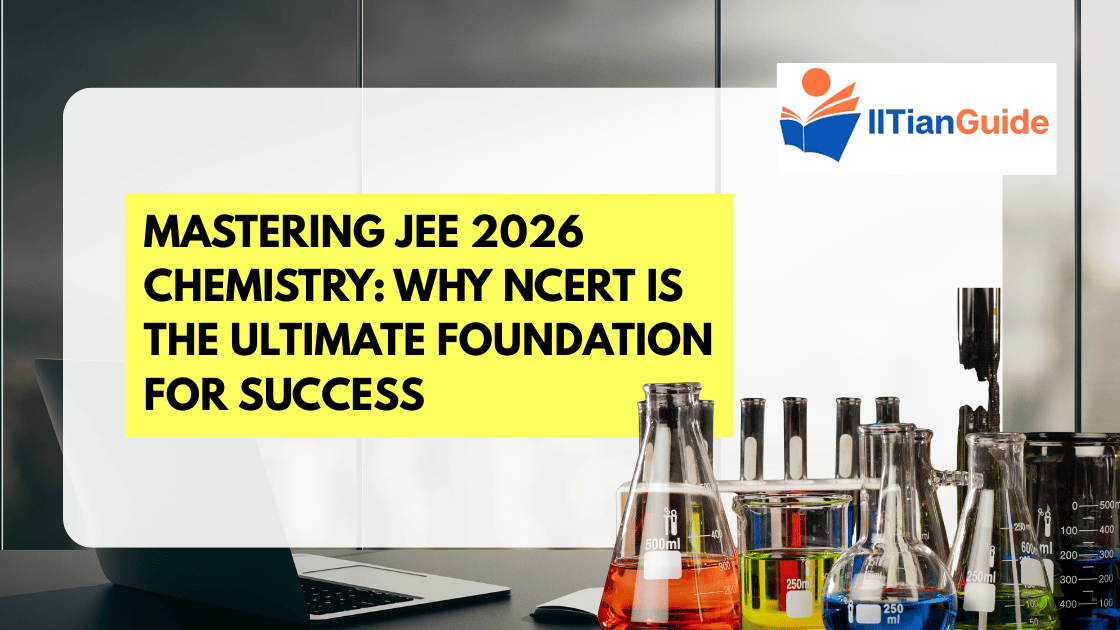Mastering JEE 2026 Chemistry: Why NCERT is the Ultimate Foundation for Success

Chemistry for JEE 2026 begins with a rock-solid foundation — and that foundation is NCERT. Most toppers and experts agree: NCERT textbooks for chemistry are not just helpful but essential for success in both JEE Main and JEE Advanced. From basic concepts to factual recall, the NCERT books cover the core syllabus in the most authentic and JEE-aligned manner.
In this guide, you will learn:
- Why NCERT is crucial for Chemistry preparation
- How to use NCERT effectively
- When and how to shift to advanced reference books
- What topics require extra focus in NCERT
Why NCERT is a Must for JEE 2026 Chemistry
1. JEE Chemistry Questions Are NCERT-Based
Over 80% of the questions in JEE Main Chemistry come directly or indirectly from NCERT. In Inorganic Chemistry, nearly all factual questions are lifted straight from the textbook lines. Even in Organic and Physical Chemistry, core definitions, reactions, and formulae are based on NCERT content.
Important keywords:
- NCERT for JEE Chemistry
- NCERT-based questions
- JEE Main Chemistry syllabus
2. NCERT Covers the Official JEE Syllabus
The NTA (National Testing Agency) uses the CBSE syllabus as the base for JEE. And NCERT textbooks are authored specifically for this syllabus. If you skip NCERT, you risk missing important conceptual explanations, terminologies, and standard reaction mechanisms.
How to Use NCERT Effectively for JEE 2026 Chemistry
Step 1: Read Every Line — Literally
NCERT is known for its precise language. Questions are often framed using the exact wording from NCERT lines. So, read every line of the textbook, not just headings or summaries.
Tip: Keep a highlighter handy. Mark important lines that are definition-based or involve exceptions.
Step 2: Focus on Diagrams, Tables, and Examples
Many aspirants overlook in-text examples, tables, and diagrams. These are often used in MCQs in disguised forms.
Example:
In s-block elements, a table of properties of alkali metals often forms the base of direct questions.
| Property | Li | Na | K |
| Atomic radius (pm) | 152 | 186 | 227 |
| Ionisation energy (kJ/mol) | 520 | 496 | 419 |
JEE has often asked — Which alkali metal has the highest ionisation energy?
Step 3: Solve NCERT Exercises and Questions
Every chapter ends with questions that are JEE-relevant. Don’t skip them. Also, make your own one-line summaries of reactions and formulae.
NCERT Coverage Strategy by Chemistry Section
Inorganic Chemistry: Stick to NCERT Word-by-Word
This section is completely memory-based. Direct lines, exceptions, and trends are important.
- Study group-wise and make quick-recall notes.
- Learn block elements in the order presented in NCERT.
- Memorise colour changes, reactions with reagents, and coordination compound basics.
Organic Chemistry: Understand Before You Cram
NCERT explains mechanisms, named reactions, and reaction types with examples.
- Practice IUPAC naming, reaction conversions, and isomerism from NCERT.
- Use NCERT to memorise the order of acidity/basicity and reaction conditions.
- Solve in-text problems to improve concept clarity.
Physical Chemistry: NCERT + Practice Problems
Here, NCERT helps build the base theory and formulas.
- Read theory topics like thermodynamics, chemical equilibrium, and electrochemistry.
- Note down all formulas, units, and graphs
- After reading NCERT, practice numericals from standard books.
When to Move to Advanced Books (And Which Ones to Use)
NCERT is the starting point, not the endpoint. Once you’re confident with NCERT, shift to higher-level problem books.
| Chemistry Branch | After NCERT, Use These Books |
| Inorganic Chemistry | JD Lee (Concise), VK Jaiswal |
| Organic Chemistry | MS Chauhan, Morrison & Boyd (for theory) |
| Physical Chemistry | N Awasthi, RC Mukherjee, P Bahadur |
Reminder: Don’t skip NCERT even after shifting. Keep revising it regularly.
Common Mistakes to Avoid
- Ignoring solved examples and summaries in NCERT
- Jumping to coaching material without completing NCERT
- Not revising NCERT multiple times
- Underestimating the importance of NCERT in Inorganic Chemistry
Conclusion
For JEE 2026 Chemistry, your best starting point — and your ultimate revision guide — is the NCERT textbook. Whether you are preparing for JEE Main or aiming high with JEE Advanced, NCERT-based preparation is non-negotiable.
Stick to a focused reading plan. Build your base with NCERT. Then extend your reach using advanced books. This layered approach ensures strong fundamentals, accuracy, and speed in the exam.
FAQs: NCERT-Focused Chemistry Preparation for JEE 2026
Q1. Is NCERT enough for JEE Main Chemistry?
Yes. For JEE Main, NCERT is more than enough for Inorganic and Organic Chemistry. For Physical Chemistry, practice additional numerical problems after learning the theory from NCERT.
Q2. Should I read NCERT line by line?
Absolutely. Many JEE questions are directly picked from NCERT lines, especially in Inorganic Chemistry.
Q3. Can I skip NCERT if I’m using coaching material?
No. Coaching material is designed to supplement NCERT, not replace it. NCERT is the foundation.
Q4. When should I start reading advanced books?
Start after you have read NCERT at least twice and solved all its questions confidently. Then gradually move to problem books for practice.
Q5. Which topics in NCERT need extra attention?
Focus on:
- Chemical Bonding
- s-, p-, d-, f-Block Elements
- General Organic Chemistry (GOC)
- Biomolecules and Polymers
- Thermodynamics and Electrochemistry

